A coming of age? Hip Hop at 40
By Ashahed M. Muhammad -Asst. Editor- | Last updated: Aug 8, 2013 - 12:44:56 PMWhat's your opinion on this article?
The dawn of a new era of responsibility or simply a powerful commercial tool?
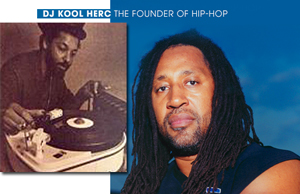
DJKoolHerc.com/
|
His legendary parties and creative method of playing old funk records while isolating the drum beat portion known as “the break,” are major foundational aspects of Hip-Hop culture and history.
Hip-Hop consists of several primary elements: rapping, break dancing, graffiti and the role of the DJ. There are other aspects that are undeniably connected such as clothing and terminology. As a cultural art form, it is undeniably true, Hip-Hop’s impact is felt far beyond the place of its origin.
With 40th year anniversary commemorations taking place across the country, there are wildly varying opinions of what Hip-Hop actually “is.” Some believe Hip-Hop music is simply a form of entertainment that can be used as a means to perhaps escape poverty and achieve extreme wealth. Others believe it is an influential marketing tool to be used to sell products and popularize brands. Still others believe it should be used to amplify the voices of the oppressed by addressing relevant social, cultural, and political issues.
In part 21 of his year-long lecture series titled, “The Time and What Must Be Done” the Honorable Minister Louis Farrakhan took square aim at the thought-controllers who shape the minds of the masses and showed many rappers that they are in many cases being used as pawns in the global “Game of Satan” with their influence being negatively used to destroy the moral fiber of the American people, and the morality of the entire world.
“So these Satanic minds have encouraged filth, they encourage vulgarity, they have encouraged savagery. They have encouraged that which it appears that we delight in to the point that so much evil and filth is coming across television, radio and movies that filth and vulgarity are now the order of the day,” he added.
It appears as if some members of the Hip Hop nation have been listening. Recently, there seems to be an increased willingness—especially by some notable “mainstream” Hip-Hop artists—to speak out and confront controversial real life issues.

T.I.
|
“My hat goes off to the Martin family, because if it was me and my child, there wouldn’t have been no trial,” said T.I. “I’d have been on trial. It would’ve been the trial of the father who killed the man who killed [my child]. That would have been my story.”
Kanye West, who spoke at the Nation of Islam’s headquarters Mosque Maryam and lent very public support for the Millions More Movement in 2005, in a recent New York Times interview, discussed his latest creative offering “Yeezus” containing such provocative song titles as “Black Skinhead” and “I Am a God.”
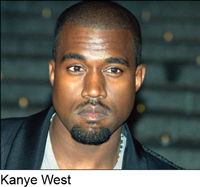
|
He went on to say some of the lyrics in his song “New Slaves” were inspired by the frustration he has felt attempting to use his gifts and talents to improve conditions.
“I want to tell people, ‘I can create more for this world, and I’ve hit the glass ceiling.’ If I don’t scream, if I don’t say something, then no one’s going to say anything, you know?”
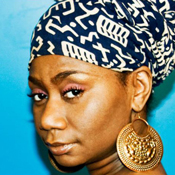
Narubi Selah
|
“Slavery begins first of all in your mind,” said Ms. Selah. “So media moguls, corporations, their aim is to enslave you mentally first…we think we’re so free, but we’re not,” she added.
Ms. Selah said the slave master has “stepped it up” so now even when artists speak out, they are still constrained, victims of a deceitful game of control and used to keep the masses of the people managed through pacification.
“He’s definitely stepped it up in terms of pacifying us now with things. When they put Obama in office that was a form of pacification. When they gave us charter schools in the ‘90’s that was a form of pacification because we were fed up with the educational system. And now they take our music,” said Ms. Selah. “Proof that we are slaves is that a slave can create but he cannot own that which he creates. Does that not go back to the plantation when Black women would bear babies and the babies would be taken from them with the umbilical cord still attached and they never saw that child again unless they ran into them on somebody else’s plantation? So now we create music and we don’t own it. They own what we create and they own us.”
Ms. Selah says recent photos of Jay Z wearing a necklace emblazoned with the flag of the Five Percenters (also called Nation of Gods and Earths), Kanye’s new content as well as J. Cole’s could have the effect of weakening strong messages and creating confusion.
“They’re changing the conscious Hip-Hop into a fad so that it loses its spice, it loses its grip, its teeth, its relevance and it becomes an outfit,” she said. “So now conscious is ‘cool’ and this is what I’m afraid is happening.”
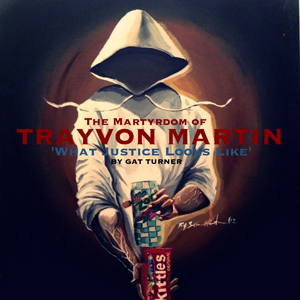
|
J.Cole’s latest offering “Born Sinner” which recently reached the top of the charts also has been called by some critics a sort of coming of age truth-telling album. On one song, the 28-year-old rapper discusses how he felt when he learned his rap idol Nas was disappointed in what he heard on the first track released on his debut CD. Undoubtedly with prodding from his label, in an effort to make music that could compete with the popular songs being played on the radio, he departed from the style that caused many to anticipate his work.
On the upside, Ms. Selah says these sparks of consciousness and expressions of frustration from well-known artists could ultimately produce something positive that can be used build upon. The same way Jay Z popularized the “dope boy” Hip-Hop ethic, parlaying it into a lucrative career, and even an entire movie soundtrack (American Gangster) perhaps some may be inspired to learn about Cuba after seeing him visit, or learn more about the Five Percenters as a result of seeing him wear the necklace.
“He has such a tremendous generation of youth following him, they are going to now ask the question about that necklace. They’re going to say: ‘What do you mean? What are you talking about? What do you mean the Black man is a god what does that mean?’ So hopefully that can infuse and spark a relevant conversation.” said Ms. Selah.
Independent Hip-Hop activist Jasiri X agreed. He said many artists are coming to the realization that even though they are highly visible, and achieving a level of material wealth, they have no real power with their labels, creative and othewise.
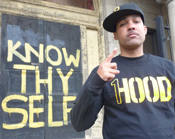
|
“New Nat Turners is an anthem. Once you recognize you are slaves, what’s the next step? The next step is that you’ve got to get free!” he said.
At the 2013 BET Awards, entertainer Jamie Foxx, who has spent time with the family of Trayvon Martin, wore a t-shirt with the slain youth’s image on it, instead of the logo of any trendy fashion designer. In fact, Mr. Foxx said he said he became inspired to do more after hearing words by the legendary Harry Belafonte encouraging others prominent entertainers to use their popularity and platforms to speak out against injustice.

Yasiin Bey
|
Jasiri X said it was one of the most powerful pieces of video he has ever seen.
Truth Universal, a New Orleans based rapper said in his view, those speaking out—especially those who are more tied to the industry—have heard something making them speak up a little more. In fact, he said even during the recent Essence Fest, there were more independent artists performing.

StaHHr
|
The power of protest
After coming under fire for a song with questionable content appearing to advocate rape, rapper Rick Ross lost lucrative sponsorships. After a terribly vulgar and insensitive lyric spewed from the mouth of Lil Wayne trivializing the murder of Emmett Till, a huge public outcry and negative publicity led to declining sales and support for him.
For his part, Lil Wayne delivered a written semi-apology and at a recent concert appearance, removed the offending lyrics from the song replacing them with a respectful shout-out to the family of Emmitt Till.
Activists say in addition to flexing their muscles and putting pressure on artists to clean up their messages, they should also vocally and financially support those actually making the types of songs with the subject matter they want to hear.
Rabb Love, founder and visionary behind Guerilla Republik clothing, whose designs have become the de facto revolutionary uniform of the Hip-Hop underground and revolutionary rappers agreed. The company authorizes some custom designs, but only in support of artists with integrity who don’t sell out for commercial gain.

|
“That’s what we look for. We look for artists who know their self-worth and those are the ones that we want to get behind because you know it ain’t no sell-out there,” he added.
Although there are endless debates on the state of Hip-Hop, Rabb Love says that is what makes it great. It embraces all. Although some who recall the “Golden Era” of rap may not prefer the styles and content of many of the newer rappers, they can still relate. He also said he respects the work ethic of some of today’s independent artists, and that there is no need to waste time complaining about them.
“That’s what Hip-Hop offers to us, it is our fountain of youth. Because we have that, there is no generation gap between our children and us. We see where corporate America is trying to take the music and we don’t agree with it, but we can still relate to it,” said Rabb Love. “I’ve learned to not look at the rapper because most of these rappers, they’re nothing but soldiers and they got orders. At the end of the day, you still have some type of obligation but it’s not the rappers that are putting out these records it’s the record label. When are we going to form organizations to attack these record labels?” he asked.
INSIDE STORIES AND REVIEWS
-
-
About Harriett ... and the Negro Hollywood Road Show
By Rabiah Muhammad, Guest Columnist » Full Story -
Skepticism greets Jay-Z, NFL talk of inspiring change
By Bryan 18X Crawford and Richard B. Muhammad The Final Call Newspaper @TheFinalCall » Full Story -
The painful problem of Black girls and suicide
By Charlene Muhammad -National Correspondent- » Full Story -
Exploitation of Innocence - Report: Perceptions, policies hurting Black girls
By Charlene Muhammad -National Correspondent- » Full Story -
Big Ballin: Big ideas fuel a father’s Big Baller Brand and brash business sense
By Bryan Crawford -Contributing Writer- » Full Story






 Click Here Stay Connected!
Click Here Stay Connected!








